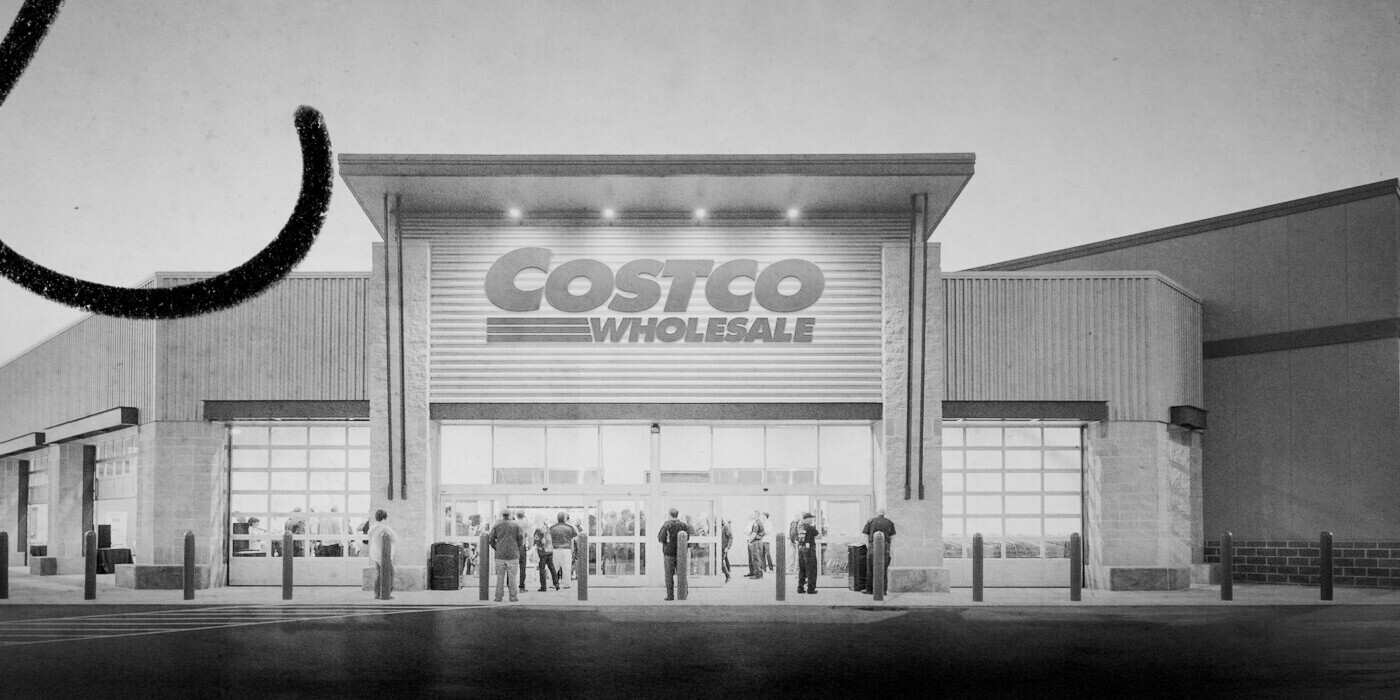
If you’re anything like the nearly 100 million people worldwide who have a Costco membership, you probably love Costco’s Kirkland Signature. You can get two dozen cage-free eggs for $6.50, or a 1.75-liter bottle of French vodka for $19.99.
But despite these products’ exceptional prices, their quality doesn’t suffer at all. In fact, the exact opposite is true. Many of their products pass purity tests with flying colors.
Kirkland also has a passionate and loyal fan base — not something you typically find with a private label brand. One guy even got a Kirkland Signature tattoo on his left arm and held his 27th birthday party at the Costco food court.
Kirkland’s success defies our intuition and experience. Shouldn’t lower prices lead to lower quality products? How can they offer rock-bottom prices but still have some of the best products around?
The answer is this: they get the best manufacturers in the world — who already have products on Costco shelves — to make Kirkland products. Yeah, you read that right. While customers might not know it, Kirkland products are often made by the same manufacturers who make the branded products that sit next to them on the shelves.
And not only that, but according to a Reddit user who worked at a Costco supplier, Kirkland products have to be at least 1% better than the equivalent branded products (on some metric of their choosing). Costco forces manufacturers to compete with a better version of themselves.
But if Costco is pitting brands against themselves, why do the brands put up with it? The short answer is that they want to. Costco is one of the largest sales channels in the world and brands can still profitably sell their products under the Kirkland brand.
In this piece, we explore how Costco leverages their high volume and strong brand to convince suppliers to manufacture products for them, and why it actually makes sense for the brands to do it. Let’s dive in.
The Beginnings of Costco
Costco was founded in 1983. It began as a business-to-business (B2B) retailer. They sold three categories of products: what businesses used in their business (food for a restaurant, for example), what businesses consumed in their business (such as toilet paper), and finally what the business owners used for personal consumption (a TV, for example).
Kirkland Signature, their extremely popular private label brand, launched nine years later in 1992. Costco co-founder James Sinegal cited one main reason that launching a private label brand was a good idea: they could undercut the big guys.
At the time, many large retailers were public companies and they faced pressure from Wall St to grow their stock price. With limited growth opportunities, they often gave into the pressure and defaulted to simply raising their prices. Sinegal saw years where commodity prices would fall, but product prices would rise. It created an “umbrella” for a private label brand to enter the market at a lower price point, so Costco launched Kirkland.
Fast forward to 2020 and Kirkland is one of the biggest and most popular brands in the US. Not just compared to other private label brands — compared to any brands.
Kirkland: 1% Better Than the Best
According to Sinegal, there are three criteria for creating a Kirkland product. First, it has to be as good (or better!) than the leading national brand. If Lipton has the best black tea, Kirkland has to be as good or better than Lipton. Next, it has to be sold for a 15-20% discount. Notably, this is a discount at the Costco price — which is already low — not the price at another retailer. And finally, the product has to be an important product for customers, something they want to buy.
And while the company doesn’t say who manufactures Kirkland Signature products, there’s some information floating around the internet. For example, it’s rumored that Kirkland actually forces the manufacturer to make the Kirkland product better than the name brand product on at least one important metric.
I found a few Reddit comments that provide some more insight (thanks to Nikita Singareddy, investor at RRE Ventures for pointing it out). From user min2themax:
Then a follow-up from Reddit user reasonableiberty: (this is crazy!)
[Emphasis mine]
Of course, this should be taken with a grain of salt. This Reddit comment isn’t verified. But if you’re willing to believe people on Reddit, I am. It explains why a lot of Kirkland products are so amazing.
How do the economics work?
Shortly after learning that brands would actually manufacture and package Kirkland products for Costco, I wondered how it worked. Why would a brand — say KIND Bars or Jiffy Peanut Butter — create a product for Costco and use the Kirkland brand? And make it 1% better than their own product?
In a normal Costco purchasing example, a company might sell their product for $0.95 and Costco might retail it for $1.00. This would result in a 5% margin (in reality the margin is a bit lower, but let’s use these numbers for estimates).
This $0.95 would be the brand's revenue. If we use some industry averages for margins — marketing budgets average 24% for CPG brands, and gross margins hover around 40-50% — then we can estimate their cost profile. In this example, let’s assume that non-marketing costs, including general & administrative expenses, are $0.60 per unit (63%) and marketing costs are $0.20 per unit (21%). The profit & loss for the unit might look like this:
What about Kirkland products? As mentioned above, Costco aims to save customers 15-20% on the Kirkland products compared to their branded counterparts. So in our example, retail price would be $0.80 per unit for the Kirkland products. If that’s the only adjustment, the brand would be in a tricky position. Marketing expense is $0.20, non-marketing expense is $0.60 and the retail price is $0.80. That wouldn’t leave much margin for either the brand or Costco. In fact, it would leave none at all.
But here’s the kicker: with the Kirkland products, brands don’t have to spend nearly as much money on marketing. They don’t need to pay for Facebook ads or run television campaigns. The only remaining marketing expense might be the account reps associated with the Kirkland account. Let’s say this lowered the marketing expense from $0.20 per unit to $0.05 per unit.
A sample P&L for a Kirkland product might then look something like this:
And thus, we realize why brands aren’t so crazy. They might not get quite as much margin on the private label line, but it’s not unprofitable.
But even with brands getting a fair margin on Kirkland products, why would they cannibalize their business like this? Wouldn’t all of their Costco sales disappear?
There are two reasons why it works out. First, most customers don’t know how Kirkland products are made. And even if they did, would they change? After all — we all know how hot dogs are made and that hasn’t stopped it from being an American classic. Marketing is powerful.
Second, it’s important to remember the sheer vastness of Costco’s revenue. In 2019, Costco brought in over $149 billion of revenue, good for 14th on the Fortune 500 list. And if a brand can weave their way into becoming one of the 3,700 SKUs in a Costco warehouse (compared to one of >100,000 in a Walmart) it gives them access to one of the highest volume sales channels in the world. The upside is so large that brands don’t mind having an unbranded version of their product sitting next to their branded product.
Private Label and Kirkland’s Advantage
The entire private label category is having a moment. It’s growing four times faster than national brands, and almost every major retailer has ramped up their private label efforts in recent years. And yet, Kirkland is still the largest one.
There’s a few reasons why Kirkland became the biggest private label brand. One reason is their low-price business model. Sinegal mentioned in a recent lecture that he prides Costco on having “absolute pricing authority”. It means customers can be absolutely sure that Costco has the lowest prices anywhere. There’s only one company at a time that can deliver on this promise! And Costco has. In fact, their whole business is built around offering lower prices. They have a captive customer base that shops in bulk at their store. And Kirkland sits right in the middle of this strategy.
But the best explanation for why Kirkland is so successful is their brand. Kirkland launched in 1992. It’s had 28 years to compound, which is much longer than most private label brands (AmazonBasics, for example, started in 2009). Additionally, Costco is laser focused on Kirkland. Kirkland stretches across all categories: from frozen salmon to plastic food wrap. In contrast, other retailers have a different brand for each category. Kroger has over a dozen private label brands, while both Target and Walmart each have over 30.
Retailers don’t market private label brands outside their stores. The only way a private label brand is built is when a customer buys a product, loves it, and wants more. Then, they repeat this process over and over again. The Kirkland Signature brand has been around for nearly three decades and spans hundreds of products. It’s had a lot of time to build up brand equity.
Takeaways From Kirkland
What can we learn from Kirkland?
Leverage your distribution. Costco built up one of the largest retail footprints in the world by ruthlessly offering the lowest prices. This distribution gives them favorable terms with everyone in the ecosystem, from suppliers to customers. Costco has a strong brand and a physical footprint that lots of customers flock to, and this gives them power in this value chain.
Consider supplier incentives. For CPG companies, customer acquisition (especially through retail) is one of the most important problems. As long as it’s profitable, these brands are willing and excited to manufacture products for Kirkland.
Great brands take years to build. It’s hard to quantify exactly how popular Kirkland has been since its founding in 1992, but no doubt that there’s been a lot of buzz about it in the past few years. It’s fully in the American zeitgeist: ask anyone where the best deals are and they will mention Costco and Kirkland. This kind of loyalty, especially without any marketing spend, just takes a long time to build.
How did you feel about this post?
The Only Subscription
You Need to
Stay at the
Edge of AI
The essential toolkit for those shaping the future
"This might be the best value you
can get from an AI subscription."
- Jay S.
Join 100,000+ leaders, builders, and innovators

Email address
Already have an account? Sign in
What is included in a subscription?
Daily insights from AI pioneers + early access to powerful AI tools
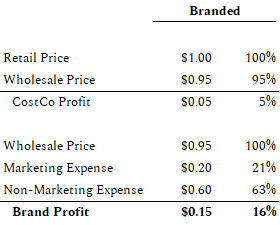
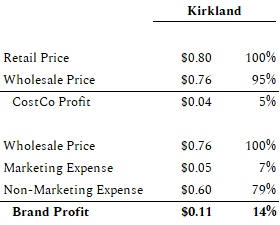






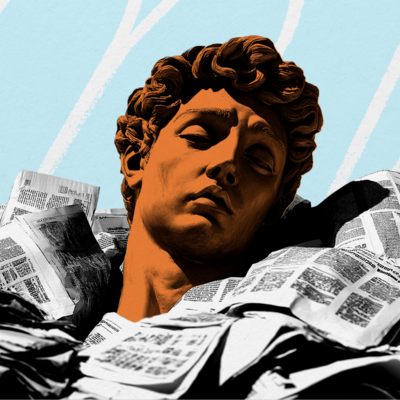
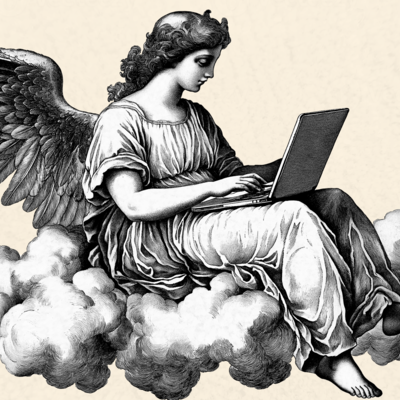
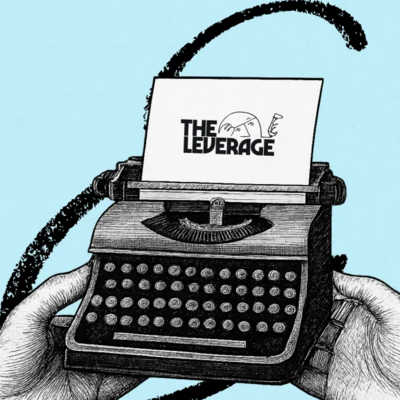

Comments
Don't have an account? Sign up!
Reddit quotes in this post are broken. Can we please fix them? :(
Interesting, especially the financial breakdown. I think another reason might be that a brand can have its cake and eat it, too. By having a Kirkland look-alike in Costco replace the brand, the brand can maintain a relationship with other retailers so people go to, say Target or Walmart or Safeway for the branded item. The brand gets to set two price tiers and profits from the knock-off that would normally be made by someone else. They also gain economies of scale, as they are manufacturing both lines. I have often seen a Kirkland product sell alongside the original branded item, then after a while, the branded item disappears and only Kirkland remains.
I don't see the marketing budget as having anything to do with it. Unless you are planning to drop your own brand and become a Kirkland only brand, then the marketing still has to be done. It's an overhead, not a 'per item' cost.
I think what you are missing is that you always want to be producing a bit more than you can sell to cover:
- any production stoppages/issues and
- cover an increase in demand, which is exactly what your marketing and sales is trying to achieve.
So if you've done a good job, you have more product than you can sell.